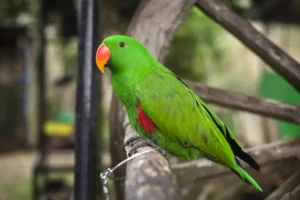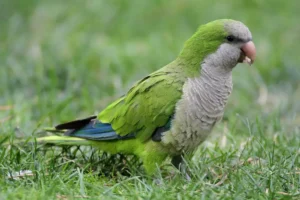There are so many different types of parrots out there, how can you possibly choose the right one for you and your family? It’s important to do your research and ask lots of questions before making a decision. Here are some things to consider when choosing a parrot:
- What size do you want?
- What color do you prefer?
- What personality traits are you looking for?
- How much time are you willing to spend caring for your new pet?
- Do you have any other pets that need to be considered when making your decision?
Once you’ve answered these questions, you can start looking at different species of parrots and narrow down your options.
Some popular choices include budgies, cockatiels, conures, macaws, and African grey parrots. Each type of parrot has its own unique set of characteristics, so take the time to learn about each one before making a final decision.
Are you looking for a new feathered friend? If so, you may be wondering which parrot is right for you. There are many factors to consider when choosing a parrot, such as size, lifespan, personality, and noise level.
Here is a brief overview of some popular parrot species to help you make your decision: Macaws are large parrots with long tails. They are very social birds and enjoy being around people.
They can live for up to 50 years in captivity. Macaws are also quite noisy and require a lot of space. Cockatiels are smaller than macaws and have shorter tails.
They are less social and more independent than macaws but still enjoy human interaction. Cockatiels typically live for 15-20 years in captivity.
They are relatively quiet compared to other parrots and don’t need as much space as macaws.
Budgies (also known as parakeets) are the smallest type of parrot. They make great first pets because they are very easy to care for.
Budgies typically live for 5-10 years in captivity and can be quite noisy at times. However, they don’t require much space and can be kept in small cages or aviaries.

How Do I Choose a Parrot for My Pet?
There are a few things you should take into consideration when choosing a parrot as your new pet. First, you need to decide what size of parrot is right for you and your home.
Smaller parrots like budgies and lovebirds can be easy to care for but may not provide the level of interaction that some people are looking for in a pet.
If you have the space and time to commit to a larger parrot, such as an African Grey or Macaw, they can make wonderful companions. Another important factor to consider is the lifespan of your potential pet.
Parrots can live 20-80 years depending on the species, so this is definitely something you need to think about before making your decision.
If you’re not ready for that kind of long-term commitment, there are plenty of other pets out there that might be a better fit for you.
Once you’ve decided on the size and lifespan of the parrot you’d like, it’s time to start thinking about personality traits. Some birds are very active and playful while others tend to be more laid back and quiet.
There is no right or wrong answer here – it just depends on what sort of personality would mesh well with yours.
It’s also important to think about whether or not you want a bird that talks or sings; some do both while others don’t make any noise at all.
Again, it’s all about finding the right match for you and your lifestyle.
The last thing to keep in mind when choosing a parrot is diet.
Some birds are vegetarians while others eat meat – there’s really no one-size-fits-all answer here so it’s important to do your research on each individual species before making your final decision.
Once you’ve taken all of these factors into consideration, then it’s time to start shopping around for your new feathered friend!
What is the Friendliest Parrot for a Pet?
There are many different types of parrots, and each has its own unique personality. Some parrots are cuddly and affectionate, while others are more independent. The friendliest parrot for a pet is the one that best suits your individual personality and lifestyle.
If you’re looking for a cuddly companion, consider a conure or quaker parrot.
These small parrots are known for their loving nature and affinity for human interaction. They enjoy being held and will often seek attention from their owners.
Conures and Quakers make great first-time pets for those who want a bird that will bond closely with them. For a more independent bird, an African grey or Amazon parrot might be a better choice.
These larger parrots are not as needy as some of the smaller species and can be content sitting on their perch while you go about your day.
African greys in particular are known for their intelligence, making them interesting companions that can keep you entertained with their tricks and chatter.
No matter what type of parrot you choose, remember that all birds need plenty of mental stimulation to stay happy and healthy.
Provide your feathered friend with toys, perches, climbing structures, and other enrichment activities to keep them occupied throughout the day.
With proper care and attention, any type of parrot can make a loving pet that brings joy to your home for many years to come.
What is the Best Parrot for a Beginner?
There are a few factors to consider when choosing the best parrot for a beginner. The first is the level of interaction and care required. Parrots are very social creatures and need a lot of attention.
If you’re not prepared to devote several hours a day to your parrot, then you should choose a less demanding species. The second factor is noise level.
Some parrots can be quite loud, so if you live in an apartment or have close neighbors, you’ll want to avoid the louder varieties.
Finally, consider the cost. Parrots can be expensive to purchase and care for, so make sure you’re prepared for the financial commitment before bringing one home.
Some good beginner parrot species include budgies (parakeets), lovebirds, cockatiels, and conures.
These birds are relatively easy to care for and don’t require as much attention as some of the larger species. They’re also relatively quiet compared to other parrots, making them better suited for smaller living spaces.
Which Bird is the Best Pet for Me?
Assuming you would like a list of the best pet birds:
- Conures
- Cockatiels
- Lovebirds
- Parakeets (Budgies)
now let’s explore each option in more detail:
- Conures: These pint-sized parrots make great companion birds and are relatively easy to care for, although they can be noisy at times.
They come in a variety of colors and some species, such as the Sun Conure, are quite striking. If you’re looking for a cuddly bird that will keep you entertained, a conure may be a good choice for you. Just be prepared for some loud squawking! - Cockatiels: One of the most popular pet birds, cockatiels are friendly, affectionate, and relatively easy to care for compared to other bird species. They come in a variety of colors and patterns and can even learn to whistle simple tunes! While they do require some daily attention and interaction, cockatiels make excellent companion birds for first-time bird owners or those with limited space (they can live happily in cages as small as 18×18 inches).
- Lovebirds: As their name suggests, lovebirds are known for being devoted mates and make great companions if bonded with another lovebird or their human owner(s). They’re relatively small birds (about 6 inches long) with vibrant plumage that comes in many different color combinations (including green, blue, black, yellow, and white). Lovebirds enjoy playing and interacting with their owners but can also be independent when necessary; making them one of the more versatile pet bird choices.
- Parakeets (Budgies): Budgerigars (more commonly known as budgies or parakeets) are small Australian parrots that make popular pets all over the world thanks to their cheerful personalities and wide array of colors and patterns. At just 6-8 inches long, budgies are one of the smallest parrot species but don’t let their size fool you – these little guys have big personalities!
What Species of Parrot is Right For YOU?
What types of Parrot do I have?
There are many different types of parrots, and it can be difficult to determine which kind you have. Here are some tips to help you figure out what parrot you have. First, take a look at the size of your parrot.
Parrots come in a variety of sizes, from very small to very large. If your parrot is on the smaller side, it is likely a budgie or lovebird. If your parrot is on the larger side, it could be an African grey, Amazon, or macaw.
Next, look at the colors of your parrot’s feathers. Parrots can be a variety of colors, but some species tend to be one color more than others.
For example, budgies are usually green and yellow, while lovebirds are typically red and orange.
African greys are mostly grey with white patches around their eyes, while Amazons tend to be green with yellow highlights.
Macaws are very colorful birds and come in a variety of color combinations including blue and gold, green and red, or purple and yellow.
Finally, consider your parrot’s personality when trying to determine its species.
Some parrots are very active and playful while others are more laid back and quiet. Some enjoy being around people while others prefer their own company.
Consider all of these factors when trying to identify your parrot’s species.
Conclusion
There are many factors to consider when choosing the right parrot for you and your family. Some things to think about include: what size parrot you can accommodate, what type of personality you are looking for, and what level of noise you are comfortable with.
There are many different species of parrots, so do some research to find the one that best fits your lifestyle.
Once you have found a few potential candidates, visit a local pet store or bird sanctuary to meet them in person and see which one is the best fit for you.
